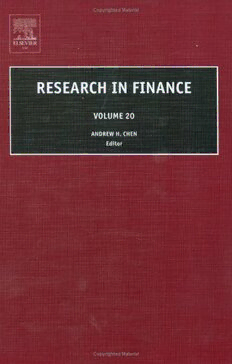
Research in Finance, Volume 20 (Research in Finance) (Research in Finance) PDF
249 Pages·2003·6.88 MB·English
Most books are stored in the elastic cloud where traffic is expensive. For this reason, we have a limit on daily download.
Preview Research in Finance, Volume 20 (Research in Finance) (Research in Finance)
Description:
Eleven papers in this volume present some current interesting and important research in finance. Based upon the CAPM, Chen and Kane show that double taxation and differential tax rates on a personal and capital-gains income, affect corporate stock values and financial policies in nonneutral ways. Sengupta shows tax evasion decisions of a monopolist in a price-ceiling regulatory environment. In their paper, Osterberg and Thomson empirically examine the impact of state-level deposit preference laws on resolution type and costs for all operating FDIC-BIF insured commercial banks that were closed, or required FDIC financial assistance, from January 1986 through December 1992. Peek and Wilcox show that during periods of international financial crises, or of domestic economic stress, the government-sponsored enterprises (GSEs) are well suited to stabilize mortgage markets.In their paper, Chen, Robinson and Siems empirically show the association between banks' subordinated debt and their loan sales activities and its implications in the transmission mechanism of monetary policy. Also in this volume, Lin et al. use the Granger causality test to examine the linkage between the euro exchange rate and the money supply and GDP in the euro community, as well as its impact on the UK exchange rate and the London stock exchange market index. In their paper, Kane and Muzere extend the Diamond-Dybvig model of bank runs to an open market economy and show that adding the central banks and the IMF, guarantees will reduce, but not eliminate the banking as well as currency crises. The paper by Chung et al. empirically shows the presence of a long memory, property in currency, future markets, and discusses its hedging implications. In their paper, Lee, Lee and Yu develop a valuation model for the pension benefit guarantees that incorporates the plan termination conditions as well as a stochastic interest rate. In a case study, Hung et al. empirically show that the specially designed dividends (SDD) have positive signals in the Taiwan Stock Exchange. Finally, in their paper, Guerard and Mark show that the use of an R&D quadratic term enhances the mean-variance efficient portfolios and stockholder returns.
See more
The list of books you might like
Most books are stored in the elastic cloud where traffic is expensive. For this reason, we have a limit on daily download.
